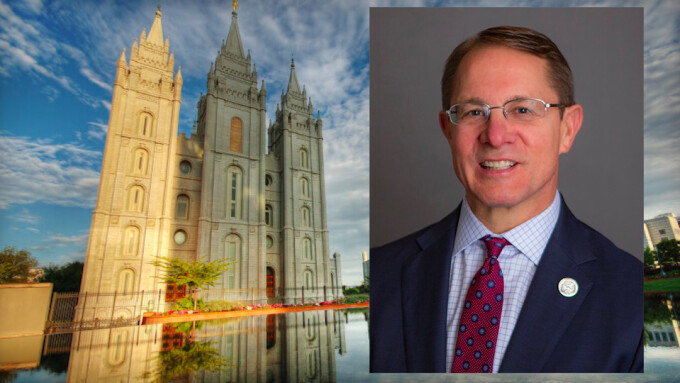SALT LAKE CITY — A Republican member of the Utah state legislature is arguing for a return to the pre-1973 standard for determining what speech or expression is “obscene” and therefore not protected by the First Amendment.
Utah Rep. Ken Ivory (R-West Jordan) previously authored a bill, HB 374, banning “pornographic and indecent books” in the state’s public schools; it was signed into law in March. Last week, he demanded a total reversal of the last 50 years of legal and judicial practice, dismissing the “Miller test,” which has been the nation's legal standard for a half century, as merely the opinion of a few Supreme Court justices at the time.
The Miller test, developed in the landmark 1973 case Miller v. California, establishes three conditions for determining “obscenity”: (i) Whether "the average person, applying contemporary community standards" would find that the work, taken as a whole, appeals to the prurient interest; (ii) Whether the work depicts or describes, in a patently offensive way, sexual conduct or excretory functions specifically defined by applicable state law; and (iii) Whether the work, taken as a whole, lacks serious literary, artistic, political or scientific value.
Ivory called for Utah to challenge the Miller test, and the “taken as a whole” concept in particular. Such a challenge, if successful, could open the floodgates for anyone wishing to challenge material based on sexual content or expression.
According to a report by local station KSL NewsRadio, before a meeting of the Education Interim Committee on Wednesday, a reporter asked Ivory if he agreed with the last 50 years of jurisprudence that works should be “taken as a whole” when determining whether they are First Amendment-protected speech.
“Three judges of nine on the Supreme Court said that,” Ivory answered. “It’s not the law. It’s not a holding of the Supreme Court and yet we act as if it is.”
The Purge of Libraries Must Go On
Ivory was at the Capitol demanding that the Utah State Board of Education (USBE) tighten enforcement of HB 374, claiming, “There are books containing graphic content that have been allowed to stay” after an initial purge.
USBE was seeking clarification about interpreting the law, leading the legislature’s managing associate general counsel, Michael Curtis, to remark that the school district is being forced to choose whether it prefers to be sued for “violating a right to access to free speech by removing a book” or for “violating a clear state statute prohibiting a material.”
Utah law, KSL NewsRadio reported, “further defines what is harmful to minors as well as pornography. Both of those definitions say a book has to be taken on the whole and assessed for its literary value.”
But Ivory and other supporters of censorship hope to appeal to Utah's indecency law, under which “if a depiction or description (of a book) violates any one of three criteria within that definition, the book can be pulled without taking it on the whole.” They cite the indecency law's language as “a bright line rule for when a book can be pulled.”
Bright Lines and 'Touching of the Human Buttock'
According to Utah state law, this “bright line” is whether a book depicts or describes the following: “Human genitals in a state of sexual stimulation or arousal. Acts of human masturbation, sexual intercourse, or sodomy. Fondling or other erotic touching of human genitals or pubic region. Fondling or other erotic touching of the human buttock or female breast that, when taken as a whole, has no serious literary, artistic, political, or scientific value for minors, considering ages of all minors who could be exposed to the material.”
The Utah version of the Miller test, specifically applied to minors, concerns whether a work “(i) Taken as a whole, appeals to the prurient interest in sex of minors; (ii) is patently offensive to prevailing standards in the adult community as a whole with respect to what is suitable material for minors; and (iii) taken as a whole, does not have serious value for minors.”
After the Education Interim Committee meeting, Ivory issued a statement contending that a guidance memo from the state attorney general supported his contention of a "bright line" rule. Ultimately, lawsuits such as those posited by the legislative counsel could test this and potentially lead to a federal ruling.






